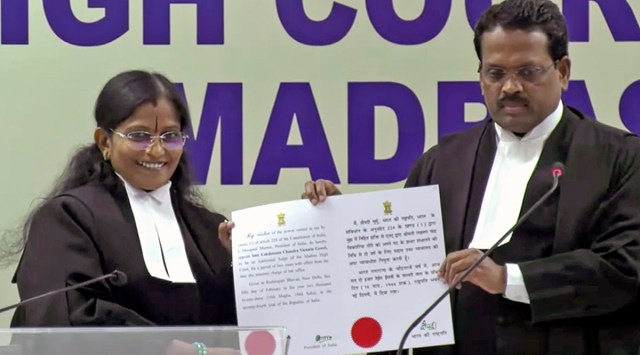Advocate Lekshmana Chandra Victoria Gowri was sworn in as an Additional Judge of Madras High Court Tuesday, minutes before the Supreme Court dismissed a plea challenging her appointment.
Pointing out that a “consultative process” had taken place before the Collegium recommended her name, the bench of Justices Sanjiv Khanna and B R Gavai said, “We are not entertaining the writ petition. Reasons to follow.”

The bench reminded the petitioners that her appointment was only as an Additional Judge and if an Additional Judge is not true to his or her oath, the Collegium has the power to not make him or her a Permanent Judge.
In Chennai, Victoria Gowri was sworn in by Acting Chief Justice T Raja.
Her elevation to the Madras High Court was recommended by the Collegium on January 17. This led to opposition from a section of lawyers in Tamil Nadu who pointed to her past association with the BJP and alleged instances of hate speech by her.
Seeking a stay on the warrant of appointment, Senior Advocate Raju Ramachandran, appearing for the petitioners, said the “material (against her) indicates a mindset which is not in tune with the ideals of the Constitution. They are antithetical to Articles 14 and 15, and would run contrary to Article 21 because equal justice is part of Article 21 as well. Therefore, a person who is not in sync with the basic principles of the Constitution is unfit to take the oath… She has rendered herself incapable of taking that oath by her own public utterances and this has a direct bearing on her eligibility”.
Ramachandran said this “material” came to light only on February 1 and as such, it “may not have been available” to the Collegium before it made the recommendation.
Story continues below this ad
The bench, however, said these are only “conjectures and surmises” that the material was not available to the Collegium. The Collegium, it said, also takes the view of consultee judges (Supreme Court judges who come from the respective High Court) before making a decision.
“There are consultee judges from the State High Court. Both are local judges. They have worked in the State of Tamil Nadu. We have to presume that they have knowledge of the facts… You can’t assume that judges from that HC are also not aware of these things,” Justice Gavai said.
Ramachandran said while consultee judges would provide valuable inputs on the person’s professional conduct and integrity, they may not be in a position to know what the candidate has said on social media.
Justice Gavai did not agree: “Sorry, that is not the case. Because we have also been consultee judges and when we give our opinion, it is based on all the factors.”
Story continues below this ad
Ramachandran pointed to recent instances where the government had objected to clearing names recommended by the Collegium citing their social media comments.
At this, Justice Gavai said, “Collegium overruled that. It said the personal political view of a candidate cannot be a ground for not recommending him or her…”
The bench also said people with political backgrounds have been judges in the past. “There have been cases where people with political backgrounds have taken oath as judges of the Supreme Court and High Court,” Justice Khanna said.
Justice Gavai said, “As a matter of fact… I also have a political background. But I have been a judge for the last 20 years. I don’t think my political views at any point of time weighed with my decisions.” He also referred to Justice V R Krishna Iyer, who was a minister in the Communist Party-led Kerala government.
Story continues below this ad
Agreeing, Ramanchandran also pointed out that Justice K S Hegde was a Lok Sabha member, Justice P B Sawant was a member of the Peasants and Workers Party. Justices F I Rebello, Rama Jois and Rajinder Sachar also had political backgrounds.
He said the instant case was not one of political opinion “but hate speech which runs completely antithetical to the basic tenets of the Constitution renders you unfit to take the oath”.
Justice Khanna said, “It’s not as if the Collegium wouldn’t be aware of what you said. If there was anything in it, they themselves would have reconsidered or whatever it was. But for us to go into all these aspects, of suitability, of merit, or selection process, would be like opening up a new jurisdiction which we have always refrained from doing.”
He said “the fact of the matter was that all these materials must have been known to the Collegium”.
Story continues below this ad
“It appears not,” responded Ramachandran, adding that the Collegium recommendations were made on January 17, whereas the material against Advocate Gowri came to light on February 1 following which a representation was addressed to the Collegium.
“That will be a presumption (to say Collegium was not aware),” Justice Khanna said.
“The consultative process has certainly taken place. All that you are saying is this particular information may not be available… Actually, the assumption is all these factors would have been considered,” he said.
“And the process originates from the High Court… two most senior judges of the High Court. You presume they are not aware of the antecedents of a candidate before they make up their minds,” Justice Gavai said.









